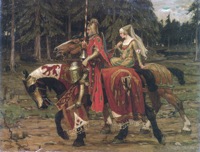Difference between revisions of "Chivalry"
m (Text replacement - "http://nordan.daynal.org" to "https://nordan.daynal.org") |
m (Text replacement - "http://" to "https://") |
||
| Line 7: | Line 7: | ||
Between the 11th century and 16th centuries Medieval writers often used the [[word]] chivalry, but its definition was never consistent between [[authors]], and its [[meaning]] would [[change]] on a basis that determines where you are, and even over time. Further, its [[modern]] meanings are [[different]] from its medieval meanings. | Between the 11th century and 16th centuries Medieval writers often used the [[word]] chivalry, but its definition was never consistent between [[authors]], and its [[meaning]] would [[change]] on a basis that determines where you are, and even over time. Further, its [[modern]] meanings are [[different]] from its medieval meanings. | ||
| − | *[ | + | *[https://en.wikipedia.org/wiki/14th_Century 14th century] |
==Definitions== | ==Definitions== | ||
*1 : mounted men-at-arms | *1 : mounted men-at-arms | ||
| Line 13: | Line 13: | ||
:b : knightly [[skill]] | :b : knightly [[skill]] | ||
*3 : gallant or distinguished [[gentlemen]] | *3 : gallant or distinguished [[gentlemen]] | ||
| − | *4 : the [[system]], spirit, or [[customs]] of [ | + | *4 : the [[system]], spirit, or [[customs]] of [https://en.wikipedia.org/wiki/Medieval_Knighthood medieval knighthood] |
*5 : the [[qualities]] of the [[ideal]] knight : chivalrous conduct | *5 : the [[qualities]] of the [[ideal]] knight : chivalrous conduct | ||
==Description== | ==Description== | ||
| − | '''Chivalry''' is a term related to the medieval [[institution]] of [ | + | '''Chivalry''' is a term related to the medieval [[institution]] of [https://en.wikipedia.org/wiki/Knighthood knighthood] which has a [[military]] provenance of [[individual]] [[training]] and [[service]] to others. It is usually [[associated]] with [[ideals]] of knightly [[virtues]], [[honor]] and [https://en.wikipedia.org/wiki/Courtly_love courtly love]. The word is derived from the French word "chevalerie", itself derived from "chevalier", which means knight, derived from "cheval", horse (indicating one who rides a horse). |
Today, the terms chivalry and chivalrous are often used to describe courteous [[behavior]], especially that of [[men]] towards [[women]]. | Today, the terms chivalry and chivalrous are often used to describe courteous [[behavior]], especially that of [[men]] towards [[women]]. | ||
Latest revision as of 23:43, 12 December 2020
Etymology
Middle English chivalrie, from Anglo-French chevalerie, from chevaler knight
The terms originated in the early history of mounted "knight" (French: chevalier), which happened in France in the late 10th century. Knights possessed military training, a war horse and military equipment which required a substantial amount of wealth and prestige to acquire.
Between the 11th century and 16th centuries Medieval writers often used the word chivalry, but its definition was never consistent between authors, and its meaning would change on a basis that determines where you are, and even over time. Further, its modern meanings are different from its medieval meanings.
Definitions
- 1 : mounted men-at-arms
- 2 : archaic a : martial valor
- b : knightly skill
- 3 : gallant or distinguished gentlemen
- 4 : the system, spirit, or customs of medieval knighthood
- 5 : the qualities of the ideal knight : chivalrous conduct
Description
Chivalry is a term related to the medieval institution of knighthood which has a military provenance of individual training and service to others. It is usually associated with ideals of knightly virtues, honor and courtly love. The word is derived from the French word "chevalerie", itself derived from "chevalier", which means knight, derived from "cheval", horse (indicating one who rides a horse).
Today, the terms chivalry and chivalrous are often used to describe courteous behavior, especially that of men towards women.
